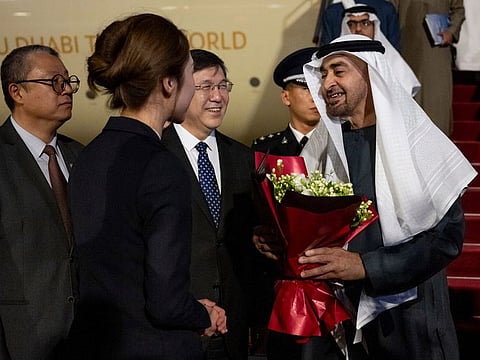UAE President arrives in Beijing at beginning of state visit to China
The two countries set to bolster four decades of strategic partnership

Abu Dhabi: President His Highness Sheikh Mohamed bin Zayed Al Nahyan arrived in the Chinese capital, Beijing, on Wednesday ahead of the start of a two-day state visit to the People's Republic of China at the invitation of President Xi Jinping of China.
The state visit of Sheikh Mohamed tomorrow, Thursday, marks a transitional shift in the enduring UAE-China ties, which have grown into a strategic partnership across various sectors.
This visit promises to propel sustainable development and prosperity for both countries, while solidifying ties and fostering collaboration across economic, developmental, and cultural spheres.
Regular dialogue, high-level meetings, and ongoing ministerial engagements demonstrate the unwavering commitment of the UAE and China to cultivating their bilateral relationship.
The UAE-China relations stretch back several decades. They started with the visit of the late Sheikh Zayed bin Sultan Al Nahyan to China in 1990, which was reciprocated by the late Chinese President Yang Shangkun’s visit to the UAE in 1989, laying the foundation for this long-standing partnership.
Previous visits
These reciprocal high-level visits, including President Xi Jinping’s visit to the UAE in 2018 and Sheikh Mohamed’s visit to China in 2019, have significantly bolstered the strategic partnership, ushering in a new era of collaboration.
Formal diplomatic ties between the UAE and China were established on November 1, 1984. China opened its embassy in Abu Dhabi in April 1985, followed by the inauguration of the UAE’s embassy in Beijing in March 1987.
Underscoring the UAE’s commitment to boosting relations, consulates were established in Hong Kong (April 2000), Shanghai (July 2009), and Guangzhou (June 2016). Meanwhile, China opened its consulate in Dubai in November 1988.
The UAE and China enjoy a comprehensive partnership, made strong by expansive cooperation and joint coordination across all levels, including the signing of over 148 bilateral agreements and memoranda of understanding (MoUs) spanning various fields.
Economic cooperation
The UAE and China’s exceptional economic partnership continues to flourish, reaching new heights of competitiveness. Collaborative efforts are expanding in sectors of mutual interest, particularly the new economy, entrepreneurship, tourism, aviation, and logistics.
The Joint Economic, Trade, and Technical Committee actively seeks promising investment opportunities in both markets, aligning with the economic visions and goals of both nations for the present and future. There are also several facilities in place which help boost ties and cooperation between the Chinese and Emirati business communities.
In 2023, the UAE’s non-oil trade with China reached a staggering Dh296 billion ($81 billion), reflecting a 4.2 per cent increase from 2022. China remains the UAE’s top non-oil trade partner in 2023, accounting for 12 percent of UAE trade.
China is the UAE’s leading import source, accounting for 18 percent of all imports. While the UAE’s non-oil exports to China stand at 2.4 percent, China ranks higher in re-exports at 8th with a 4 percent share. Notably, excluding oil trade with Arab nations, China’s trade with the UAE is the highest at 30 percent.
From 2003 to 2023, UAE investments in China reached $11.9 billion across diverse sectors like telecommunications, renewable energy, transportation, hospitality, and rubber. Conversely, Chinese investments in the UAE totalled $7.7 billion during the same period.
The UAE actively participates in China’s Belt and Road Initiative (BRI) launched in 2013. This initiative aligns perfectly with the UAE’s strategic location, economic leadership, and Centennial development goals. BRI further strengthens the UAE’s role in global trade and supports its re-export focus.
Belt and Road Initiative
The UAE actively participates in the Belt and Road Initiative (BRI) due to its development capabilities, strategic location, and significant economic influence in the region. This initiative, started by Chinese President Xi Jinping in 2013, highlights the UAE’s importance in global trade and complements the country’s Centennial development objectives. Additionally, the BRI promotes the re-export sector, a key component of the UAE’s non-oil trade activities with other countries.
Tourism
Tourism is a cornerstone of UAE-China economic ties. Over 1 million Chinese tourists visited the UAE in the first ten months of 2023, with a resident Chinese community of roughly 350,000. Over 210 monthly flights connect the two countries, operated by the UAE national airlines. During the 8th meeting of the Joint Economic, Trade, and Technical Committee in Abu Dhabi in February, both nations emphasised joint tourism initiatives to promote their diverse offerings and attract a wider global audience.
Culture and education
Cultural exchange is pivotal to UAE-China relations, recognised by both nations as a powerful tool for building bridges of understanding and cooperation. This vibrant partnership is marked by frequent student visits, exchanges between cultural and media officials, and collaborations among researchers. Since 1989, a series of cultural agreements have solidified this partnership. These include the 1989 UAE-China Cultural Cooperation Agreement and the 2001 Cultural and Media Cooperation Agreement.
The Sheikh Zayed bin Sultan Al Nahyan Centre for Arabic Language and Islamic Studies, established in 1990 at Peking University, has contributed to spreading Arab culture in China and promoting the Arabic language. Cultural weeks, music festivals, book fairs, and joint events further enrich this growing relationship.
Education is another pillar of UAE-China relations, fostering a thriving exchange of students and collaboration between universities and institutions.
A 2015 memorandum of understanding on higher education cooperation promotes collaboration in science, upholds educational quality, fosters exchange programs, and awards scholarships.
In 2019, a project aimed at teaching the Chinese language in 200 schools was launched in the UAE, and has seen tremendous success, attracting over 71,000 students across 171 schools. This initiative reflects the strong Emirati interest in learning Chinese and fostering cultural and human connections.
Sign up for the Daily Briefing
Get the latest news and updates straight to your inbox


